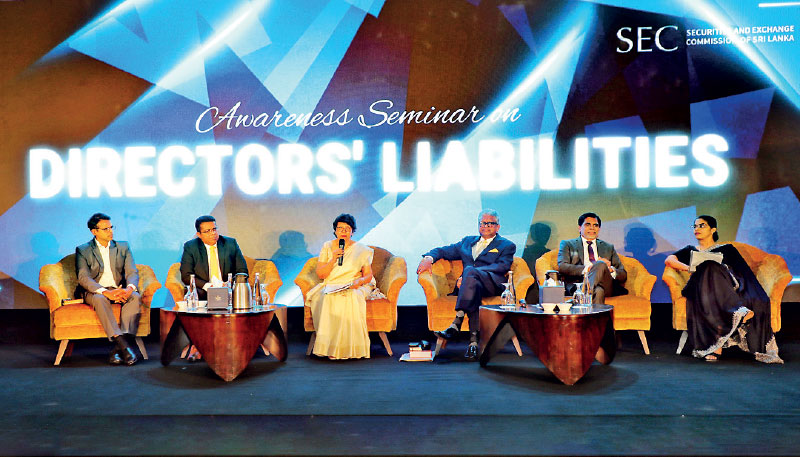Saturday Feb 21, 2026
Saturday Feb 21, 2026
Monday, 10 November 2025 03:34 - - {{hitsCtrl.values.hits}}

From left: F J & G de Saram Partner Buwaneka Basnayake, SEC Commission Member Laknath Jayawickrama, Nexia Consultants Consultant Company Secretary Chandanie Weragala, President’s Counsel Dr. Harsha Cabral, CSE Consultant and former Chief Regulatory Officer Renuke Wijayawardhane and Registrar of Companies L.K. Sunethra Dharmakeerthi

|
SEC Chairman Senior Prof. Hareendra Dissabandara |
|
President’s Counsel Dr. Harsha Cabral
|
The Securities and Exchange Commission of Sri Lanka (SEC) last week conducted a special awareness session on “Directors’ Liabilities” for directors of listed companies, with over 150 listed company directors participating.
The session was held as part of the SEC’s ongoing commitment to fostering good governance and transparency in the capital market.
In his opening remarks SEC Chairman Senior Prof. Hareendra Dissabandara highlighted the critical role of board leadership in strengthening the capital market.
“The strength of companies lies in the quality of their leadership. The strength of the market lies in the integrity of Boards,” the Chairman stated.
He emphasised that when directors fulfill their responsibilities consciously, investor confidence is enhanced, market participation increases, and capital formation accelerates.
“Directors’ responsibilities are not just about avoiding punitive measures but about promoting long-term value, preserving reputation, and protecting stakeholder interests,” he noted.
Delivering the keynote address, Dr. Harsha Cabral, President’s Counsel, commended the SEC for its proactive approach in promoting awareness among directors.
“It is a very healthy step taken by the SEC to invite directors of listed entities to gain more exposure to new and evolving areas of Corporate Governance,” Dr. Cabral said. “The SEC has taken a lead role in promoting awareness of directors’ duties, responsibilities, and liabilities, and that is a commendable initiative.”
Dr. Cabral elaborated on the evolution of company law in Sri Lanka, noting that with the enactment of the Companies Act No. 7 of 2007, the country moved away from the traditional English company law model and adopted a modern, regulated framework based on Canadian principles.
“This Act introduced, for the first time, clear statutory provisions defining directors’ duties and liabilities,” he explained. “Section 187 very clearly provides that directors must act in good faith and in the best interest of the company, this is the cornerstone of corporate responsibility.”
He emphasised that directors must be well-versed with the internal governance framework of their companies.
“Every director must be familiar with the Articles of Association of their company, it is the constitution of the company. Unfortunately, many directors have not even read it. You cannot discharge your duties if you do not understand your company’s own governing document.”
Highlighting the standard of care expected of directors, Dr. Cabral stated that directors must exercise prudence and diligence in all decisions.
“Directors must not act recklessly or negligently. They must exercise the same care a parent would in safeguarding their family, acting prudently, responsibly, and in good faith.”
He further cautioned directors on conflicts of interest and the importance of transparency in board deliberations:
“Conflicts of interest must be clearly declared and recorded. Failure to do so can expose directors to serious legal consequences. Transparency in Board deliberations is essential for integrity and investor confidence.”
Discussing financial prudence, he described the solvency test under Section 57 as the “golden thread that runs across the entire fabric of corporate law,” reminding directors to remain conscious of their company’s financial health.
He also drew attention to the broad spectrum of legal liabilities faced by directors, stating that there are 37 civil and 131 criminal liabilities under the Companies Act, underscoring the need for integrity and accountability in decision-making.
“Boards must comprise competent, responsible individuals,” he said. “If shareholders appoint the wrong people, they must also be prepared for the consequences. Sound governance begins with strong and ethical leadership.”
Following the opening remarks, a comprehensive panel discussion moderated by Nexia Consultants Consultant Company Secretary Chandanie Weragala, addressed critical aspects of directors’ responsibilities and regulatory compliance.
Speaking on directors’ reliance on management information, SEC Commission Member Laknath Jayawickrama, outlined a practical framework for assessing the appropriateness of such reliance.
“When we make decisions, we have to act in a manner which is not reckless or negligent. The key question is how we ensure this,” Jayawickrama stated. He emphasised that directors’ ability to rely on information depends on several critical factors, including the timing of information provision, whether the subject matter falls within the director’s domain knowledge, and the qualifications of external experts providing advice.
“If we are getting Board papers well in advance, I can make adequate queries. But if we are getting Board papers at the last minute, my ability to ask the right questions is eroded,” he explained, highlighting how late provision of information can compromise effective Board oversight.
Jayawickrama also stressed the importance of clarity in Board papers: “Some Board papers are very precise and clear, with proper conclusions. Some are ambiguous. When we don’t have proper conclusions as a director, we are not sure whether the person forwarding the Board resolution has made up his mind or has come to a proper conclusion.”
CSE Consultant and former Chief Regulatory Officer Renuke Wijayawardhane emphasised the importance of vigilance in recognising early indicators of financial difficulties, noting that financial distress does not occur overnight.
“There are triggers, there are early indicators. As directors of listed companies, you should have the capacity of understanding it in a very timely manner. Most of these figures actually relate to the financial statements, the transparency, integrity and timeliness of financial statements,” Wijayawardhane stated.
He cautioned Boards against over-reliance on audit committees: “You should not leave that to the accounting person. Everything is handed over to the audit committee Chairman who is also an accounting professional. Others are just relaxing. No, you can’t do that because these are the early signs which can blow up into a real catastrophe.”
Wijayawardhane identified several critical red flags that Boards must monitor, including delays in preparation of financial statements, reluctance by management in providing information, frequent restatements of accounts, and key personnel departures. “If the audit committee gets the audited accounts and the accounts are qualified, then they start fire fighting. It is too late,” he cautioned.
He also highlighted the serious consequences of delisting under new regulations: “Under the new delisting rules, if it is a mandatory delisting, you lose the fit and propriety. You can’t be on the Board for three years. It’s very important that you understand these things.”
F J & G de Saram Partner Buwaneka Basnayake emphasised that compliance fundamentally begins with understanding a company’s legal capacity and obligations under the law.
“Compliance is all about what you should do and shouldn’t do at a fundamental level,” Basnayake stated, highlighting that Section 2 of the Companies Act articulates the capacity of a company to carry on its business, subject to its articles and written law.
He stressed that effective delegation is crucial to maintaining compliance: “It is impracticable for the Board of directors as a collective or individual director to look into all compliance aspects. Delegation is a key component of compliance. These functions have to be delegated to the relevant experts, those who have relevant expertise in those areas.”
Basnayake outlined practical measures for ensuring ongoing compliance, including developing comprehensive checklists, establishing well-articulated action plans with timelines, and conducting periodic awareness programs. However, he cautioned that systems alone are insufficient: “It’s all well and good to have the mechanisms in place, but if the implementation is lax, you will anyway get into trouble. It will be too late when you find out that the entire compliance culture has broken down.”
Addressing the critical issue of disclosure requirements for director resignations, Basnayake provided clarity on the timing and compliance obligations under the Listing Rules and Companies Act.
“The Listing Rules are pretty clear. You need to make an immediate disclosure market announcement of a resignation of a director. So it all boils down to the effective date of the resignation,” he explained.
He detailed the legal framework governing resignation timing: “Section 207 of the Companies Act says a director can resign by issuing a letter of resignation to the registered office of the company, and the resignation becomes effective on the receipt by the company of the resignation letter, or if the letter specifies a later date, on that later date.”
Addressing the complex interplay between recent amendments to Section 211 of the Companies Act and the Listing Rules regarding director independence, Wijayawardhane clarified the stricter requirements for maintaining independence status beyond age 70.
“That’s an interesting scenario. The new Companies Act amendments have clarified the position with regard to the continuation of a director who is more than 70. But that’s a statutory provision. Our rules are related to the independence of the person. So the rule still remains, if you’re over 70, you are not independent,” Wijayawardhane stated.
Registrar of Companies L.K. Sunethra Dharmakeerthi, provided comprehensive guidance on the practical implementation of beneficial ownership provisions under the Companies Act No. 12 of 2025, emphasising the critical timelines and obligations for listed companies.
She outlined the specific requirements for existing companies: “Under Section 130H, you have to disclose the information of the ultimate beneficial owners of existing companies within six months from the date of operation of the new Companies Act. However, if it is a company listed on the stock exchange, you have to share the ultimate beneficial owner information through the CSE to the Registrar of Companies not within six months, but within 30 days from the date of operation.”
The session provided directors with practical insights into their responsibilities and the evolving regulatory landscape. The dialogue underscored the SEC’s commitment to working collaboratively with market participants to strengthen corporate governance standards and enhance investor confidence in Sri Lanka’s capital market.